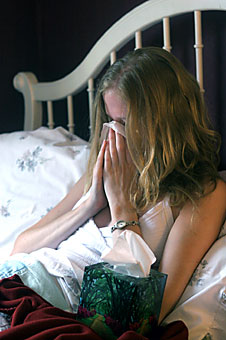 |
|
Courtney Smith/Arizona Daily Wildcat
|
An increase in exposure to germs that comes with the beginning of a new school year has resulted in record numbers of students visiting Campus Health Service so far this season. At-home cures include gargling with warm salt water and taking steamy showers.
|
|
|
By Ariel Serafin
Arizona Daily Wildcat
September 9, 2005
Print this
Record number of patients walking in
A record number of students have been trying to get walk-in appointments to cure their seasonal illnesses at Campus Health Service, creating a longer wait for students who want to see a doctor, officials said.
A total of 146 walk-in patients came to Campus Health Tuesday and another 131 came in Wednesday, the highest number officials have yet to see, said triage nurse Tara Harper.
Students who wish to make appointments with Campus Health are strongly encouraged to call before they come in because they may not be able to see a doctor otherwise.
Students must first see a triage nurse, who will then determine if they need additional medical attention, pending on the urgency and time available.
"If you walk in without an appointment, you can expect about an hour-and-a-half wait to see a triage nurse," Harper said.
Students who do call before coming in may also have to wait to see a doctor. Harper said that students who called with an illness like a cold could expect to wait up to 24 to 48 hours to receive an appointment.
The high sickness level is not unusual, however, as many illnesses can be attributed to stress and exposure to germs that comes with the beginning of a new school year, Harper said.
"In the beginning of the semester everyone's immune system is down," Harper said.
The overload of students seeking care is mainly because of the new, more convenient location next to many large residence halls, which encourages students to come in once they are sick because it's close by, Harper said.
Despite longer wait times, the time availability at Campus Health is competitive when compared with other health services, Harper said.
"(An hour and a half) is much better than the community standards," Harper said. "If you go to the E.R. you might wait six hours."
The most common complaints being treated at Campus Health are upper respiratory illnesses, colds and sinus infections. Bug bites are also a common complaint, which she felt was caused by more activity in insects as a result of the monsoon season, Harper said.
"People are complaining a lot about bug bites, which can make you sick too," said Amandip Birdi, a molecular and cellular biology freshman, who said she has heard several students complaining about mosquito bites.
But there are many suggestions for students who wanted to upkeep their health, most of which Harper described as "common sense."
Maintaining a regular sleep pattern, staying well hydrated, eating regularly and nutritiously, getting exercise and washing hands often are all effective ways to stay healthy, Harper said.
Harper also said when students cough, they should cover their mouth using their sleeves, rather than their hands which spread germs easily.
Unlucky students who do get sick can take many measures to try and regain their good health.
Most upper respiratory illnesses are because of infections by common cold viruses. Antibiotics are ineffective against viruses, according to a Campus Health handout on the illness.
Treating your symptoms while your own immune system fights off the infection is the only treatment available, which can be done by getting rest, using medication like Ibuprofen and taking in two to three quarts of clear fluids daily, according to the handout.
In order to avoid feeling drowsy and overmedicated, Harper emphasized the importance of only taking medications that treat symptoms that are present.
"If you don't have a cough, you don't need a cough suppressant," Harper said.
Gargling with warm salt water for a sore throat and taking a steamy shower to help congestion were also at-home cures the Campus Health handout suggested.
Psychology freshman Alex Ennuso, who was recently sick, said he had his own at-home remedies he found helpful.
"I always take these things called Airbornes," Ennuso said.
Ennuso said lots of sleep and frequent naps in between classes was the reason his cold only lasted three days.
But students should come to Campus Health first if all other remedies fail, Harper said.
"I would encourage it to be people's first call or first stop," Harper said, although she added, "An ounce of prevention is worth a pound of cure."
